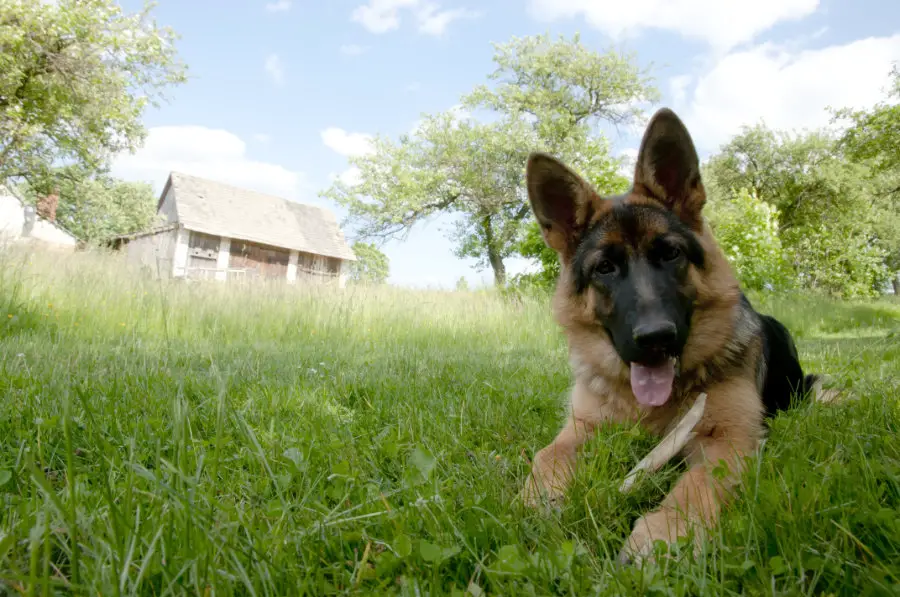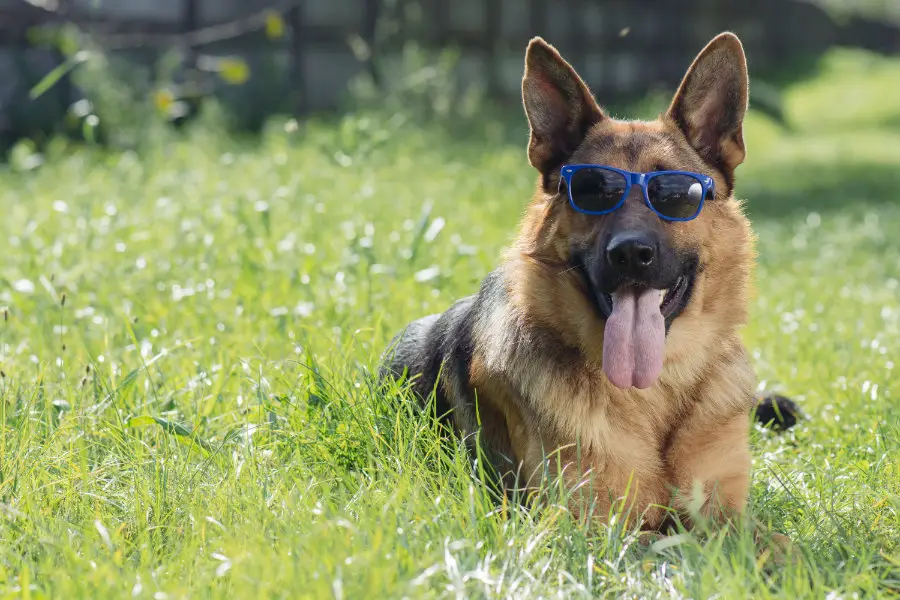Many families choose German Shepherds as pets because of their intelligence, courage, watchfulness, and obedience. Most often, owners prefer to keep their dogs indoors to watch over and protect the family, but some people choose to let their dogs live the majority of their lives outside, usually when the dog is bred explicitly for work. But can German Shepherds live outside?
Adult German Shepherds can tolerate living outdoors, as long as they have access to adequate shelter, are properly socialized, and in good health. German Shepherds left to live outdoors permanently and without shelter and socialization could become ill or develop behavioral problems, including aggression.
Living outdoors is possible and can be safe, but owners must remain vigilant and ensure they’re providing their German Shepherd with everything it needs to live a happy, healthy life. Read on to learn more.

Can German Shepherds Tolerate Winter Weather?
German Shepherds can tolerate winter weather. That’s because German Shepherds have a medium-length double-coat—a dense, outer coat that may be straight, wavy, or wiry, and a thick undercoat. The undercoat provides insulation and the outer coat provides some protection against snow and rain.
A healthy, adult German Shepherd with a thick double-coat can tolerate living outdoors in cold conditions fairly well. With that said, an outdoor German Shepherd still needs access to adequate, weather-resistant housing that provides protection from the elements.
Although German Shepherds are able to tolerate cooler temperatures, they’re not well-adapted to living in extreme winter environments like other breeds. Their coat does provide some insulation, but not enough to protect them from such extreme weather conditions, including ice and below-freezing temperatures.
Can German Shepherds Tolerate Summer Heat?
German Shepherds generally do well in colder conditions, and may not tolerate heat very well. They can overheat quickly, leading to heatstroke. A German Shepherd that lives outdoors should always have access to shade and cool, fresh water. In extreme temperatures or humidity, bring them inside.
Summers can be hot and humid in many parts of the world, so dogs living in such an environment cool themselves by evaporating moisture from their lungs through panting. When humidity is too high, there is a lot of moisture in the air and it prevents this cooling process. As a result, a German Shepherd’s temperature can skyrocket quickly.
People who live in hot climates should not allow their dog to permanently live outdoors. Short periods of time spent outdoors is okay, as long as there is adequate shade, fresh water, and protection from the elements. Owners should make it a point to keep a watchful eye on their dog while it’s outside.
Do German Shepherds Need Socialization?
It’s important to protect a German Shepherd’s health by providing adequate outdoor housing and protection from the elements, but these dogs also need socialization to live a happy life.
In the wild, wolves—a dog’s closest ancestor—live outdoors in packs. Therefore, dogs, including German Shepherds, are highly social animals that put a heavy emphasis on their people, who they treat as their “pack.”
German Shepherds require socialization. Isolating them from human companionship deprives them of something they instinctively need to remain content. Without human companionships, or at least the companionship of other dogs, a German Shepherd can become stressed.
Dogs exhibit stress through digging, barking, howling, whining, chewing, escaping, and hyperactivity. These problems can become incredibly troublesome and lead to territorial behavior and aggression. Being alone for long periods of time is not good for any domesticated dog.
If you intend to let your German Shepherd live outdoors, it’s vital that you provide a pack for him—at least one or more dogs for him to live, bond, and socialize with. Sleeping in a pack will help keep a dog warm during the cooler months and it is identical to the way canines live in the wild. If you cannot provide a pack for your dog, then you’ll need to socialize with him regularly.
The best way to do this is by bringing your dog indoors.

Do Working Dogs Need To Sleep Outdoors?
Working dogs often sleep outdoors or away from the family, however, they should not be left alone constantly. German Shepherds that work are often out of their kennels for hours everyday, working, training, and socializing.
As mentioned in the previous section, German Shepherds, like most domestic dogs, are social pack animals. If they are regularly left outside, away from people and other animals, they cannot establish those important social bonds they so desperately need. This goes for working dogs as well.
For example, K9s spend at least eight hours a day out of the kennel with their handlers. Livestock guardians also work around the clock, alerting their owners about intruders and protecting the flock.
Working dogs prefer to sleep outdoors where they have a full view of their area and the sheep. These canine guardians view the flock as their pack. In these cases, the dog is getting the socialization that it needs.
With that said, it is okay for a working dog to sleep outdoors, but it still needs some form of daily socialization, training, and exercise to establish a bond with its owners.
By regularly socializing with your German Shepherd, you establish a strong relationship, which leads the dog to think of you as part of its pack. If the dog is isolated, it will not see members of a family as a pack and therefore, feel no obligation to protect you or respond to your commands.
Age And Health Are Important To Consider
A German Shepherd that stays outside permanently can be susceptible to more health issues. Many of these issues come from a lack of cleanliness. It’s easy to get dirty outdoors, especially without adequate shelter. Dogs that are dirty could end up with matted fur, reducing its protective qualities.
In addition to hygiene issues, there are also environmental dangers. Dogs that live the majority of their lives outdoors are more likely to come into contact with dangerous plants and animals.
Any owner that chooses to let their dog stay outdoors should regularly inspect the area to ensure that it is free of any dangers.
If your German Shepherd has health issues, such as hip dysplasia, epilepsy, degenerative myelopathy, bloat, allergies, or other issues, it should not be left to live outdoors, as the elements may only exacerbate these health problems.

How A German Shepherd Can Safely Live Outdoors
Although it’s not ideal for such social animals, German Shepherds can safely live outdoors as long as their needs are met and owners ensure they live a happy life.
Some of the things a German Shepherd needs to live outdoors are as follows:
- Adequate shelter. A German Shepherd’s shelter must be completely weatherproof—insulated, layered with warm bedding, and waterproof.
- A healthy diet. The German Shepherd diet should be rich in protein and fat to keep their bodies strong, and their fur healthy and capable of protecting them during harsh conditions.
- Access to fresh water. Water should not be allowed to freeze or become too warm. Bowls should be heavy so that they don’t blow over in high winds or get knocked over by the dog.
- Regular checks. If your dog is living outdoors, check on him often. Make sure he has fresh water and check the area for any dangers. If the dog shows signs of discomfort, bring him indoors.
- Spend quality time with him daily. Socialization is so important to dogs, including German Shepherds. They need time to bond, as well as physical and mental stimulation.
All of the recommendations above will keep your German Shepherd as comfortable as possible. However, if the weather or temperatures are extreme, the dog needs to be brought inside. Also, keep in mind that if a dog is left to live permanently outdoors with no socialization or proper training, it may be more prone to behavioral issues.
Final Thoughts
German Shepherds are resilient animals that are capable of living outdoors—but they still need the same love, affection, and care as indoor dogs. They require constant access to fresh water, shelter, and should be regularly socialized.
Your German Shepherd should be brought inside during extreme temperatures to ensure its safety. Before making any decision regarding your dog’s shelter, speak to your veterinarian for professional advice.
